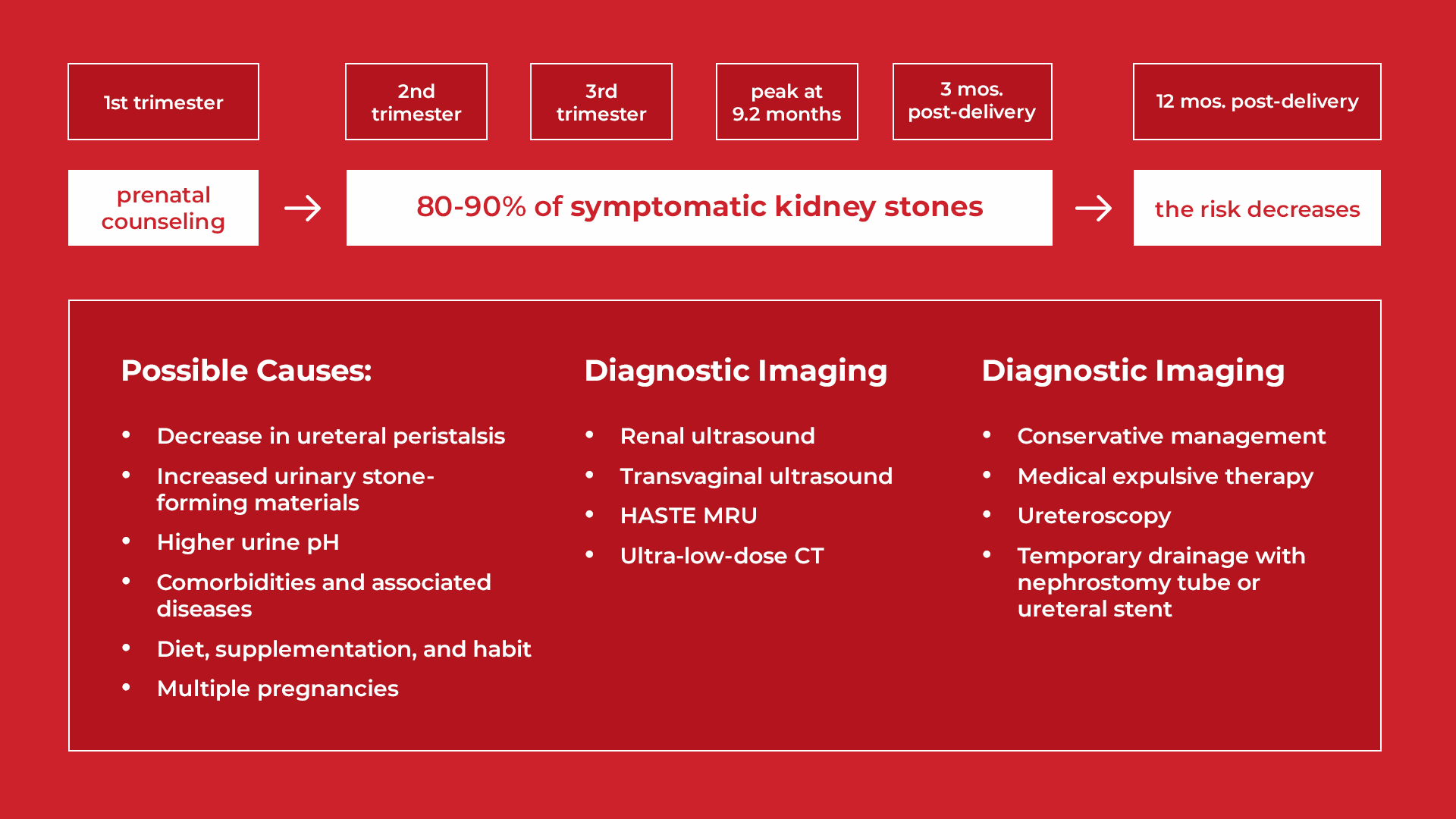Kidney Stones During Pregnancy: What You Need to Know
Kidney stones during pregnancy are more common than you might think and can create serious discomfort. In this blog, I walk you through why they form, when they typically happen, how they’re diagnosed safely, and your treatment options. Understanding these basics can help you better protect yourself and your baby during this important time.
Key Takeaways:
-
Hormonal changes like increased progesterone can trigger kidney stones during pregnancy.
-
Most stones form in the second or third trimester.
-
Safe imaging options like ultrasound are crucial for diagnosis.
-
Hydration and citrate intake are powerful ways to help prevent stone formation.
When it comes to kidney stones during pregnancy, statistics show that about one in every 200 to 1500 women will experience them. On the surface, this doesn't seem like a lot, but it’s actually the leading cause of hospital admissions for pregnant women. Most cases happen during the second and third trimesters.
If you've had kidney stones before, you could even experience them during the first trimester. Typically, symptoms show up as flank pain, which is felt in the mid-back, below the ribs, and above the hips. This pain comes from something called hydronephrosis, where a kidney swells due to urine backing up behind a stone.
You may also notice blood in your urine, called hematuria. But diagnosing kidney stones during pregnancy can be tricky. Pregnancy comes with all kinds of new aches and pains, so working closely with your medical team is crucial to getting an accurate diagnosis.

Why Kidney Stones Form During Pregnancy
Hormonal changes drive most kidney stones during pregnancy. The biggest culprit is a hormone called progesterone.
First, progesterone decreases urinary peristalsis, meaning the smooth muscle contractions that help move urine slow down. As urine lingers in the kidney, it creates the perfect environment for stones to form.
Second, progesterone causes urine pH to become more alkaline, moving beyond the neutral 6.5 to 7.5 range. When urine becomes too alkaline, it favors phosphate crystallization over oxalate, shifting stone risk from calcium oxalate stones to calcium phosphate stones.
Finally, many women take prenatal vitamins loaded with synthetic calcium, which the body often doesn't recognize well. Instead of being used for bone health, much of that synthetic calcium gets flushed into the urine, increasing the risk of stone formation even further.
How Kidney Stones Are Diagnosed During Pregnancy
Imaging is the safest way to confirm kidney stones during pregnancy, but safety for your unborn child is the priority. This rules out CT scans and X-rays, because they use ionizing radiation, which can be harmful.
Instead, most doctors use ultrasound. There are two types:
-
Renal ultrasound scans the kidneys from the outside.
-
Transvaginal ultrasound checks lower in the urinary tract if a stone has traveled closer to the bladder.
Ultrasound is very safe, but it can be inaccurate — especially if you're overweight or if the stones are very small.
Another option is the HASTE MRU (Half-Fourier Single-shot Turbo Spin Echo Magnetic Resonance Urography). It’s almost as accurate as a CT scan but uses non-ionizing radiation. Still, even non-ionizing radiation (like WiFi or radio waves) isn't completely risk-free, so you’ll want to discuss imaging carefully with your medical team.
Treatment Options for Kidney Stones During Pregnancy
If you do have a kidney stone, your options depend on the stone’s size, location, and how much it's affecting you or your baby.
1. Hydration
Simple but powerful. Drink between 96 and 128 ounces of water daily. That’s about three liters to one gallon. Steady hydration (about one cup per hour while awake) helps flush the kidneys, preventing stone-forming particles from sticking around long enough to crystallize.
2. Citrate Boosting
Adding lemon or lime juice to your water increases citrate levels, which blocks calcium from binding with oxalate or phosphate. If acidic drinks bother your teeth, freeze-dried citrate supplements are a great alternative.
3. Ureteroscopy
If stones are too large to pass naturally or cause severe blockage, ureteroscopy might be recommended. This moderately invasive procedure uses a laser to break up the stone so it can pass more easily.
4. Ureteral Stent
A ureteral stent is a temporary tube inserted to bypass the blockage and allow urine to drain from the kidney to the bladder. It’s moderately invasive but can relieve symptoms quickly.
5. Nephrostomy Tube
In more severe cases, a nephrostomy tube might be needed. This involves inserting a tube through the side into the kidney to drain urine into a bag. It's more invasive but necessary if urine flow is completely blocked.
6. Medical Expulsive Therapy
Some doctors may suggest medical expulsive therapy using drugs designed to speed stone passage. While tested safe in animal models, research on pregnant humans is limited. Always proceed with caution and in partnership with your healthcare team.
Final Thoughts
Kidney stones during pregnancy can feel overwhelming, but with the right knowledge and team in your corner, you can manage them safely. Focus on hydration, be mindful of your supplement sources, and work closely with your doctors to choose the right treatments for you and your baby.





